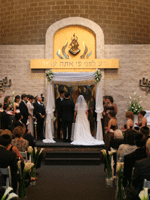Marriage
Marriage

“It is not good for man to be alone: I will make a fitting helper for him.” These are the words God spoke in the book of Genesis shortly after creating the first human being, Adam. After this proclamation, God created Eve to be Adam’s partner in life. Thus, from God’s words and actions, we understand the human impulse for companionship and life-long partnership with a “fitting helper.”
Finding the right partner is so vital that a midrash (rabbinic teaching on the Torah) says that since God created the world, God has been working hard at arranging matches for people. This indicates our tradition's high priority to finding our soulmate. Rabbi Maurice Lamm once wrote, “If God created man and woman and their marriage relationship; and if the creation of man and woman is good and marriage a blessing; then God is a conscious, albeit silent, partner in the marriage. Thus, the ideal Jewish marriage is a triangle composed of two human beings and their Creator….God naturally sanctifies Jewish marriage.”
If you read this because you are planning your Jewish wedding, let us offer you a mazel tov! Finding your soulmate and preparing to begin your life together is a beautiful and exciting event.
There is much to do in planning a wedding. The first step is picking a date. There are certain days and times of the year when Jewish weddings don’t take place, so it’s best to check with a rabbi before picking your date. Now, as you begin your planning, let us offer a brief description of Jewish weddings.
The belief that God is an interested party in each marriage permeates all we do at a Jewish wedding. Before the ceremony, some couples participate in a ritual called being in which the groom ensures the woman beneath the veil is indeed his intended! This hearkens back to our ancestor Jacob, who married the wrong sister! Following the bedeken is the signing of the ketubah (the marriage contract). Finally, the ceremony itself consists of several parts. The first is called kiddushin (sanctification) or erusin (betrothal). During this initial phase, there is the recitation of a blessing, the drinking of wine by those being married, and the exchanging of rings. The second part is called nisuin (the nuptials) and consists of reciting the sheva brachot (seven blessings) concerning creation, joy, the bride and groom, and another drink of wine. The two parts of the ceremony are most often separated by the reading of the ketubah (wedding contract) and words of wisdom and inspiration by the officiant.
It is genuinely a mechaya – a delightful life-affirming action – to marry one’s soulmate. We at CBE are here to help you during this particular time. We encourage you to consider getting married in our beautiful sanctuary, signifying your commitment to our tradition and one another. There have been many beautiful weddings (and receptions) here at Beth Emeth over the decades. Whether you hold the ceremony here or at another venue, Rabbi Aft can make your wedding even more unique, combining the essential elements of all Jewish weddings with the personal touches you want.
For more information about planning your wedding, don't hesitate to get in touch with Rabbi Warner at rabbiwarner@bethemeth.org. Finally, you would like more detailed information about Jewish weddings. In that case, we recommend reading The New Jewish Wedding, Revised by Anita Diamont, or The Everything Jewish Wedding Book by Rabbi Hyim Shafner.
Sat, April 26 2025
28 Nisan 5785
Looking to join our congregation? Become a member today!
Shabbat/Holiday
This week's Torah portion is Parshat Shmini
Candle Lighting
| Shabbat, Apr 26, 7:41pm |
Havdalah
| Motzei Shabbat, Apr 26, 8:39pm |
Shabbat Mevarchim
| Shabbat, Apr 26 |
Privacy Settings | Privacy Policy | Member Terms
©2025 All rights reserved. Find out more about ShulCloud

